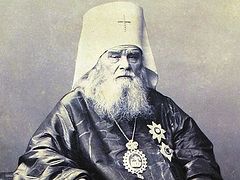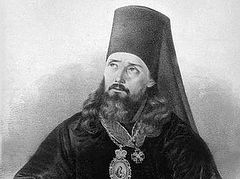 On September 23/October 6, the Orthodox Church commemorates the glorification of St. Innocent (Veniaminov), Metropolitan of Moscow and Kolomna, known as the Apostle of America and Siberia. He brought the Gospel to the Aleutian Islands and Kamchatka, preaching the word of God among the Koryak, Chukchi, and Tungusic peoples, and in the Yakut Region, North America, and the Amur and Ussuri Regions.
On September 23/October 6, the Orthodox Church commemorates the glorification of St. Innocent (Veniaminov), Metropolitan of Moscow and Kolomna, known as the Apostle of America and Siberia. He brought the Gospel to the Aleutian Islands and Kamchatka, preaching the word of God among the Koryak, Chukchi, and Tungusic peoples, and in the Yakut Region, North America, and the Amur and Ussuri Regions.
Spending most of his life traveling, St. Innocent translated the catechism and Gospel into the Aleutian language, and in 1833, he wrote one of the best works of Orthodox missionary work in this language—The Indication of the Way into the Kingdom of Heaven. In 1859, the Yakuts first heard the Word of God and the Liturgy in their native tongue. St. Innocent finished his ministry in the Moscow See. He was canonized in 1977, when the Russian Orthodox Church was under the yoke of state “guardianship,” and canonizations were extremely rare. The editorial board of the site of the Volgograd Diocese is in possession of a unique document that reveals some details of how the canonization was prepared, and how it all began.
This is a letter to His Holiness Patriarch Alexei (Simansky) of Moscow and All Russia from Metropolitan John (Vendland) of New York and the Aleutian Islands, who was leading the American Exarchate of the Moscow Patriarchate at that time.
Your Holiness, beloved father and archpastor!
To this day, there are no canonized local saints in the vast American Exarchate of our Church whose names can be remembered before God as special patrons and intercessors for the American Church.1
Meanwhile, there are ascetics of piety who have labored on the American land and have shown signs of true holiness in their lives (and after death).
It would seem to me very appropriate for the Russian Orthodox Church, as the Mother Church that brought the light of Orthodoxy to the American continent, to be the first to speak its word in this sacred work and name those ascetics whom we could reverently calls saints and invoke in our prayers.
For my part, I would venture to offer to the benevolent attention of Your Holiness the names of ascetics, who, as it seems to me, are worthy of being canonized as saints. I put forth their names and a brief biography in historical order.
These are the monk Fr. Herman, the American missionary, and Metropolitan Innocent (Veniaminov) of Moscow, who spent a significant part of his life in the greatest of missionary labors in America.
Metropolitan Innocent of Moscow’s grave is located in the Holy Trinity-St. Sergius Lavra, and in the event of his canonization, we will have no difficulty in glorifying his holy relics.
Allow me to briefly recall the life of this Holy Hierarch, using V. Alekseev’s article published in the Journal of the Moscow Patriarchate, #7, 1949, “His Eminence Innocent, Metropolitan of Moscow.”
Metropolitan Innocent (in the world John Popov, then Veniaminov from the age of nine) was born on August 26, 1797 in the village of Anginskoe, Irkutsk Governorate, in the family of a church sexton. He lost his father at the age of six and was brought up in poverty and labor.
In 1818, he graduated from the Irkutsk Theological Seminary. He was married in 1817 and ordained as a deacon, and in 1821 he was ordained as a priest.
Fr. John Veniaminov began his missionary labors in 1823.
When the Holy Synod ordered the Irkutsk bishop (then Bishop Mikhail) to allocate a priest for missionary work for the Aleutian Islands, one by one the priests refused such an assignment.
But Fr. John Veniaminov himself appealed to Bishop Mikhail and asked to be sent together with his wife and children.
Fr. John spent fifteen years of uninterrupted labors on the Aleutian Islands, where his wife and children shared a harsh life with him in the primitive conditions of a hut, and then a house built with his own hands on the cold and wet sea island among a friendly but alien and wild people. These fifteen years are an example of what stands on the verge of self-sacrificing podvig and wonders.
Fr. John not only preached and served, but he also taught the Aleutians carpentry and joinery, working together with them. He didn’t confine himself to learning Aleutian colloquial speech, but studied the Aleutian language in depth and compiled its grammar with an appendix of Aleutian songs. Thus, he brought this hitherto unknown language into the realm of study.
Fr. John wrote a catechism and translated the Gospel of Matthew into the Aleut language.
Moreover, Fr. John made a number of valuable observations on the nature of the Aleutian Islands, which received practical application. Thus, he did work that was useful not only for the Church, but also for our Fatherland.
It is impossible to imagine the difficulties and dangers that Fr. John had to endure while traveling around the islands in a fragile indigenous boat in the cold and foul weather. It is even more difficult to imagine how Fr. John emerged victorious from the struggle against the vices of the local population, which had become a tradition, namely, with slave ownership, with the murder of slaves at the burial of nobles, with internecine strife, quarrels, and fights, and with polygamy and extramarital cohabitation. But he overcame these vices to the degree that the flock of Christ’s sheep increased, triumphing by example of his personal life, labors, preaching, and conversations. His talks and preaching were distinguished by simplicity and accessibility, were so warmed by love that they established a real filial relationship between the flock and their pastor.
The small book by Fr. John Veniaminov, The Indication of the Way into the Kingdom of Heaven, repeatedly reprinted in America and now again reprinted (under the name of Talks of Innocent, Metropolitan of Moscow) serves as a wonderful example of concise, thoughtful, heartfelt, and convicting missionary preaching.
Speaking of the human side of Fr. John’s missionary labors, we could say that they themselves represent a miracle of selfless activity.
But well-known miracles in the literal sense also accompanied this work. Angels appeared to an old man, Ivan Smirennikov, foretelling the arrival of Fr. John on Aunu’u Island. Smirennikov informed the residents of the island, and on the specified day, they met Fr. John with great hospitality and joy.
After fifteen years of labor on the Aleutian Islands and on the coast of Alaska, in 1838, Fr. John arrived in St. Petersburg, leaving his family in Irkutsk.
It pleased God to call Fr. John’s matushka to Himself at just that time.
After the death of his wife, his daughters began college and his son entered the St. Petersburg Theological Academy, and Fr. John became a monk with the name Innocent.
On December 15, 1940, Archimandrite Innocent was consecrated as Bishop of Kamchatka and the Kuril and Aleutian Islands, and on September 27, 1841, he again arrived in America, in Novoarkhangelsk.
He continued his missionary activity, now accompanied by miracles of healing after Baptism.
An elderly woman on the brink of death was brought to Baptism on a stretcher and returned home on her own two feet.
A young man who had suffered from bouts of insanity since his youth was completely healed after being baptized.
Archbishop Innocent spent the following years (presumably after 1850?) on the Asian mainland, where he established a diocese in Yakutsk, and then in Blagoveschensk.
And there his tireless missionary labors continued. As once did the holy Apostle Paul, Archbishop Innocent had to endure the troubles of traveling. Once his wagon overturned and he badly bruised his side on a rock; another time, he and the wagon fell into some sagebrush and he was soaked through with cold water.
Feeling ill and weak of vision, Archbishop Innocent was already thinking of retiring.
But the providence of God judged otherwise. In 1867, Metropolitan Philaret of Moscow reposed, and Archbishop Innocent was appointed his successor. Metropolitan Innocent remained on the Moscow Cathedra from 1868 to the very day of his repose on Holy Saturday, March 31, 1879, proclaiming the word of truth and zealously contributing to the missionary work of the Russian Orthodox Church.
I earnestly entreat Your Holiness and the Holy Synod of the Russian Orthodox Church to canonize the American missionary Metropolitan Innocent of Moscow among the saints. Through this, I hope the Mother Church’s gracious influence on our American Exarchate will be strengthened and the Exarchate will receive its Heavenly patrons.



